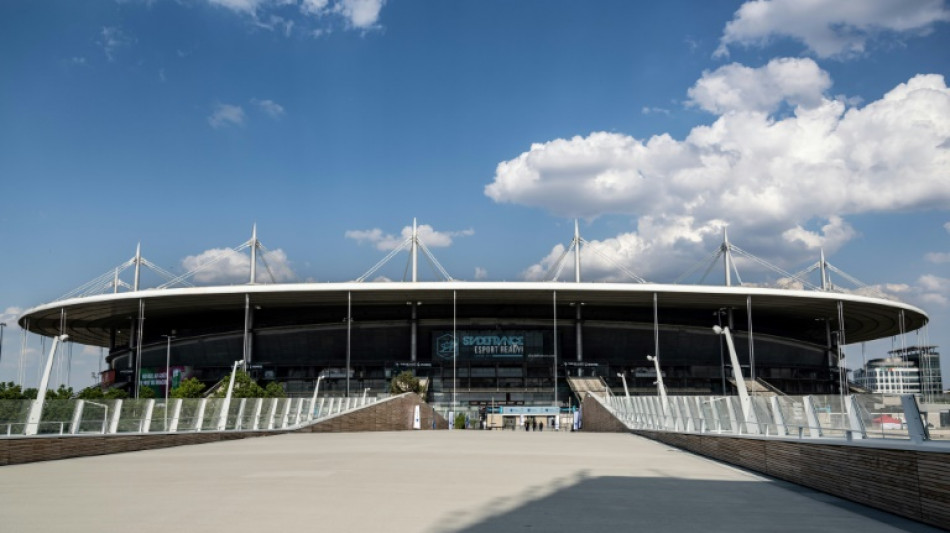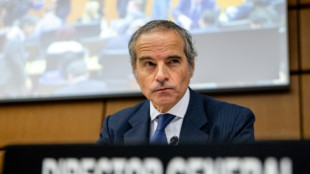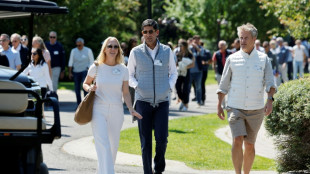
-
 Fela Kuti: first African to get Grammys Lifetime Achievement Award
Fela Kuti: first African to get Grammys Lifetime Achievement Award
-
'Schitt's Creek' star Catherine O'Hara dead at 71

-
 Curran hat-trick seals 11 run DLS win for England over Sri Lanka
Curran hat-trick seals 11 run DLS win for England over Sri Lanka
-
Cubans queue for fuel as Trump issues energy ultimatum

-
 France rescues over 6,000 UK-bound Channel migrants in 2025
France rescues over 6,000 UK-bound Channel migrants in 2025
-
Surprise appointment Riera named Frankfurt coach

-
 Maersk to take over Panama Canal port operations from HK firm
Maersk to take over Panama Canal port operations from HK firm
-
US arrests prominent journalist after Minneapolis protest coverage

-
 Analysts say Kevin Warsh a safe choice for US Fed chair
Analysts say Kevin Warsh a safe choice for US Fed chair
-
Trump predicts Iran will seek deal to avoid US strikes

-
 US oil giants say it's early days on potential Venezuela boom
US oil giants say it's early days on potential Venezuela boom
-
Fela Kuti to be first African to get Grammys Lifetime Achievement Award

-
 Trump says Iran wants deal, US 'armada' larger than in Venezuela raid
Trump says Iran wants deal, US 'armada' larger than in Venezuela raid
-
US Justice Dept releases new batch of documents, images, videos from Epstein files

-
 Four memorable showdowns between Alcaraz and Djokovic
Four memorable showdowns between Alcaraz and Djokovic
-
Russian figure skating prodigy Valieva set for comeback -- but not at Olympics

-
 Barcelona midfielder Lopez agrees contract extension
Barcelona midfielder Lopez agrees contract extension
-
Djokovic says 'keep writing me off' after beating Sinner in late-nighter

-
 US Justice Dept releasing new batch of Epstein files
US Justice Dept releasing new batch of Epstein files
-
South Africa and Israel expel envoys in deepening feud

-
 French eyewear maker in spotlight after presidential showing
French eyewear maker in spotlight after presidential showing
-
Olympic dream 'not over', Vonn says after crash

-
 Brazil's Lula discharged after cataract surgery
Brazil's Lula discharged after cataract surgery
-
US Senate races to limit shutdown fallout as Trump-backed deal stalls

-
 'He probably would've survived': Iran targeting hospitals in crackdown
'He probably would've survived': Iran targeting hospitals in crackdown
-
Djokovic stuns Sinner to set up Australian Open final with Alcaraz

-
 Mateta omitted from Palace squad to face Forest
Mateta omitted from Palace squad to face Forest
-
Djokovic 'pushed to the limit' in stunning late-night Sinner upset

-
 Tunisia's famed blue-and-white village threatened after record rains
Tunisia's famed blue-and-white village threatened after record rains
-
Top EU official voices 'shock' at Minneapolis violence

-
 Kremlin says agreed to halt strikes on Kyiv until Sunday
Kremlin says agreed to halt strikes on Kyiv until Sunday
-
Carrick calls for calm after flying start to Man Utd reign

-
 Djokovic to meet Alcaraz in Melbourne final after five-set marathon
Djokovic to meet Alcaraz in Melbourne final after five-set marathon
-
Italian officials to testify in trial over deadly migrant shipwreck

-
 Iran says defence capabilities 'never' up for negotiation
Iran says defence capabilities 'never' up for negotiation
-
UN appeals for more support for flood-hit Mozambicans

-
 Lijnders urges Man City to pile pressure on Arsenal in title race
Lijnders urges Man City to pile pressure on Arsenal in title race
-
Fulham sign Man City winger Oscar Bobb

-
 Strasbourg's Argentine striker Panichelli sets sights on PSG, World Cup
Strasbourg's Argentine striker Panichelli sets sights on PSG, World Cup
-
Jesus 'made love': Colombian president irks Christians with steamy claim

-
 IAEA board meets over Ukraine nuclear safety concerns
IAEA board meets over Ukraine nuclear safety concerns
-
Eurozone growth beats 2025 forecasts despite Trump woes

-
 Dutch PM-elect Jetten says not yet time to talk to Putin
Dutch PM-elect Jetten says not yet time to talk to Putin
-
Social media fuels surge in UK men seeking testosterone jabs

-
 Forest face Fenerbahce, Celtic draw Stuttgart in Europa League play-offs
Forest face Fenerbahce, Celtic draw Stuttgart in Europa League play-offs
-
US speed queen Vonn crashes at Crans-Montana, one week before Olympics

-
 Trump nominates former US Fed official as next central bank chief
Trump nominates former US Fed official as next central bank chief
-
New Dutch government pledges ongoing Ukraine support

-
 Newcastle still coping with fallout from Isak exit, says Howe
Newcastle still coping with fallout from Isak exit, says Howe
-
Chad, France eye economic cooperation as they reset strained ties


The Paris Olympics have bold climate plans, but few specifics
Organisers of next year's Paris Olympics say they want its carbon footprint to be half that of previous summer Games, but with a year to go observers say they still do not have enough detail to verify the plans.
Citing climate change as "the greatest challenge humanity has ever known", organisers have said they can reduce greenhouse gases from the Games with a variety of measures, including renewable energy and using existing venues rather than building new ones.
That would, they say, allow them to halve CO2 emissions from the estimated 3.5 million tonnes generated during the 2012 London and 2016 Rio Games.
"It's a fine promise," said Martin Muller, Professor of Geography and Sustainability at the University of Lausanne, adding the target itself is a first.
But "I don't have the figures to believe it," he told AFP.
Muller would like open access to precise data. Otherwise, he said, "I can't understand on what basis this has been calculated".
- Planes, stadiums and snacks -
For the time being, the organisers have sketched out forecasts.
Expected emissions break down into three areas -- travel, buildings and other activities like accommodation, security and catering -- which each account for roughly a third of emissions.
With the venues themselves, the organisers say they have limited the construction footprint with a 95 percent reliance on existing or temporary arenas, unlike the much-criticised football World Cup in Qatar.
This decision to use as much existing infrastructure as possible was praised by Gilles Dufrasne, of Carbon Market Watch, as a "thoughtful approach".
Other ideas include using renewable energy or serving "low carbon" meals with less meat.
"The other big item is emissions from spectators arriving by plane," said Muller.
Even if venues have to be accessed by public transport, organisers will have little control over how people arrive into the country.
Around a quarter of the total emissions is expected to be from spectator travel alone.
- Offsetting -
For these types of emissions, the organisers say they are supporting projects to “offset” the carbon pollution.
"All emissions that cannot be avoided will be offset by projects designed to bring both environmental and social benefits on all five continents,” they said.
This involves, for example, financing the planting of trees to absorb CO2 or clean cookstove projects.
The organisers promise to be rigorous in their selection of projects, but offsetting in general is often subject to criticism for variable accounting methods and difficulties in verifying the amount of carbon removed.
"Offsetting is a measure of last resort," said Muller.
- What next? -
Paris 2024 organisers hope to set a "new standard" for future Olympics.
But experts argue the Games should be thinking much bigger -- by thinking smaller.
A study published in 2021 in Nature Sustainability, and led by Muller, looked at 16 Summer and Winter Olympic Games between 1992 and 2020, representing a total cost of more $70 billion.
They found that overall sustainability has declined over time and made three main recommendations.
"First, greatly reducing the size of the event," the researchers said.
"Second, rotating the Olympics among the same cities; third, enforcing independent sustainability standards."
Key is the reduction of spectators arriving by plane, with Dufrasne imagining ultimately an "all-TV" event, with broadcasts to local stadiums around the world.
L.Janezki--BTB




